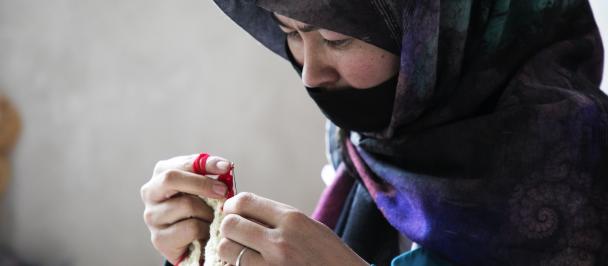From Silicon Valley to innovation hubs in China, from the ICT sector in India to tech startups in Sweden, it is not unusual to note that there is a gender gap in the workforce. In a sector generally tagged as a boys’ club, young women face many barriers to be a part of and pursue careers as innovative entrepreneurs. So, how do we change this? See the work that is being done at UNDP Sri Lanka.
“Being a part of HackaDev was a lifechanging moment for us all,” recalls Shanmitha Shanmugan from Hatton, a small town in Sri Lanka, as she speaks of her experience as one of the selected teams from HackaDev 2018.
Achieving the Sustainable Development Goals (SDGs) requires young people – both women and men - to be at the centre of the development of a country. Thus, in 2015, understanding the power of youth, UNDP Sri Lanka together with the telecom company Dialog developed “HackaDev”, a flagship initiative piloted as a social innovation hackathon, where the ‘hacking’ was on development issues. In 2017, it scaled up to a national programme when it partnered with the Sri Lanka government, gaining wider reach and greater investment. It has now become a platform where young people are given the space and support to develop their innovative ideas to tackle social issues in Sri Lanka.
Asia is a leading actor in the rise of the digital revolution. Sri Lanka, for example, is home to many Information and Communications Technology (ICT) giants. Many young Sri Lankans are actively engaged in this sector. However, women remain underrepresented as they encounter gender-based barriers in the form of bias and prejudice before and after entering this male-dominated industry. In HackaDev, the gender gap was also apparent among the participants in its first few editions.
Thus, the HackaDev team had an idea to start addressing this issue. In 2018, it became mandatory for each team to have at least one female member. While some partners were skeptical of this new regulation, the results turned out to be better than expected! Women’s representation increased to 36% in 2018 compared to the average of 10% that was prevalent in the previous years. For the first time, there was an all-women’s team participating in HackaDev’s social innovation camps.
In the 2019 edition, women’s participation rate increased once again. With over 2,350 youths engaged from across Sri Lanka, around 43% of attendees were young women, participating either in mixed-gender groups or all-women’s teams. In the west coast city of Negombo, for the first time, the programme had a room with more women participants than men.
Another element that helped improve the gender balance among participants was when HackaDev moved away from ‘Hackathon’ - which is strictly centered around ICT - and became a multi-staged innovation platform. This shift attracted more students and young professionals from diverse fields that have a stronger participation of women, such as medicine, social sciences, and management. As a consequence, the profile of HackaDev participants saw a substantial increase of women. Moreover, the change helped to open up digital innovation spaces, usually predominantly occupied by men, to more young women.
In the majority of instances, more young women are taking on leadership roles in their teams, becoming the person responsible to present their ideas in auditions and on the ongoing social innovation camps. A female participant from the 2019 Idea Auditions in the Eastern Province said, “ideas and solutions that were hidden within me as a young woman have now been brought to light thanks to HackaDev.”
Tharmavel Lakshana, 23-year-old, shared her thoughts on how she felt like being the only female member of her team. “I don’t feel any different to the rest of my team members. They treat me equally and with respect. The rest of the boys saw the unique characteristics that I would bring to the team and asked me to sign up. So far it’s been a great experience.”
Lakshana was a participant of the 2nd Social Innovation Camp 2019. Being a young woman from the Tamil community she shared how the reaction of her friends and family was when she announced her participation. “The interaction with boys is very limited in our community, so when they heard that I was joining a team with 4 other boys, my friends discouraged me. But still I persisted, and my parents have been very supportive because they saw the value of the HackaDev programme for me.”
In a sector where women’s participation is lagging behind in the workforce, HackaDev is providing support for young women to push boundaries and break stereotypes as the next generation of leaders, thinkers and creators. One such trailblazer is the 24-year-old Nivarthana Sandeepani, a student at the University of Sabaragamuwa. After being a participant of HackaDev 2018, she kickstarted mini-workshops on social innovation and created a blogging platform to regularly share articles and blogs on the same theme with an online community.
And it all started with a small requirement from UNDP to oblige all participating teams to have at least one female member. Now in its 4th year, the programme is in a constant process of learning and evolving to ensure gender equality and diversity. While encouraging diversity, in 2019, teams with young people with disabilities and/or ethnic diversity were also given preference within the selection process.
As a famous saying goes, “it’s not about ideas. It’s about making ideas happen.” This is exactly what HackaDev has been actively doing with youth in Sri Lanka from day one and will continue to strive to Leave No Youth Behind.
Story by: Communications Team, UNDP Sri Lanka
Originally published in the Gender Equality Newsletter Vol. 4
PDF version of the Newsletter - click here

 Locations
Locations





